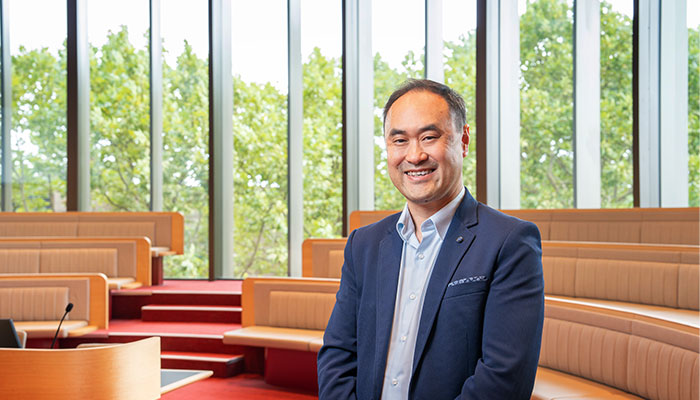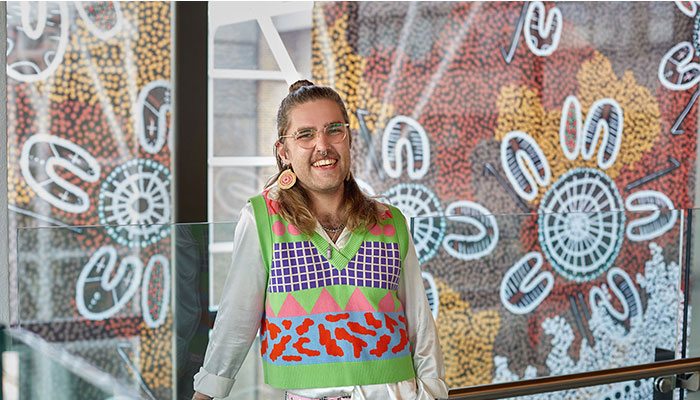Teacher: Philip is a Professor at Macquarie Law School, Faculty of Arts, Macquarie University, and Managing Director of Australasian Legal Information Institute (AustLII).

Groundwork: Philip holds a Bachelor of Laws, a Bachelor of Economics with first-class honours in Computer Science and Operations Research from the University of Sydney, a Graduate Diploma in Legal Practice from the University of Technology Sydney (UTS), and a Doctor of Philosophy in Law from the University of New South Wales (UNSW). He is a Fellow of the Australian Academy of Law.
What Philip says:
I am so pleased to join Macquarie Law School and be part of Macquarie University. I’m excited about the future of legal research and the role technology could play in transforming access to justice. Whether through improving legal research infrastructure, advancing AI in the legal domain, or advocating for free access to legal information, I’m passionate about finding ways to make the law more accessible and understandable for everyone. It’s a challenging but deeply rewarding journey, and I’m always looking for ways to collaborate and learn from others in this space.
My research focuses on the interaction between information technology (IT) and law, particularly in applying IT to the legal domain to achieve practical outcomes with a strong social justice impact. I am especially interested in the technical, legal, and policy challenges surrounding free access to law and improving access to justice.
My career path has been shaped by a deep interest in law and information technology. After completing my undergraduate studies, I recognised the transformative potential of technology to improve access to legal information and contribute to greater access to justice. This led me to join AustLII shortly after its inception, and I have been deeply involved in its growth and expansion to provide free, public access to law. My academic career, which began at UTS and then UNSW, has been focused on bridging the gap between law and information technology to create more equitable and accessible legal systems.
AustLII was founded in 1995 by Professor Graham Greenleaf (then at UNSW, now at Macquarie) and Professor Andrew Mowbray (UTS). Their vision was to provide the Australian public with free access to essential legal information – fundamental to the rule of law and the effective functioning of democracy. I joined the team soon after its founding and have been actively involved in developing and expanding AustLII’s capabilities. Currently, I serve as Managing Director, overseeing its strategic direction and continued growth.
AustLII receives more than 800,000 page accesses per day, serving as a vital national legal research infrastructure. It hosts a comprehensive, integrated national collection of over 1000 searchable legal databases, including cases, legislation, journal articles, law reform reports, reports of royal commissions, coronial findings, treaties and related instruments, and Indigenous legal resources. AustLII also plays an international role in supporting the rule of law and promoting access worldwide. It has assisted in the development of free access to law facilities in many countries and was one of the founders of the Free Access to Law Movement (FALM) in 2002.
My appointment as a Member of the Order of Australia (AM) acknowledges my contributions to this work. It also underscores the broader significance of public access to legal information in advancing access to justice, strengthening the rule of law, and supporting legal education.
My research is inherently applied, focusing on solving real-world problems in legal information access. I take an interdisciplinary approach, integrating computer science, law, and policy research to improve legal information systems. Engagement is central to this work – AustLII collaborates with legal professionals, universities, policymakers, and international organisations to develop legal research tools that are widely used by the legal community and the public.
What I find most rewarding about my research is its tangible impact on access to justice. Knowing my work helps individuals, legal professionals, and researchers navigate the law more easily is incredibly fulfilling. Seeing how legal information technology empowers people – whether it’s a self-represented litigant finding case law or a policymaker using AustLII’s tools for legal research – reinforces the importance of this work. Universities, as institutions at the forefront of societal progress, fulfill a crucial function in ensuring that access to legal information remains a public good that benefits society as a whole.
How would you like your students to view you?
I would like my students to see me as both a mentor and a collaborator – someone who is passionate about the role of information technology in shaping the future of law while taking a pragmatic approach to solving real-world legal challenges. I hope they view me as someone who encourages critical thinking, innovation, and problem-solving, helping them bridge the gap between theory and practice. Most importantly, I want them to see that legal research and technology have the power to drive meaningful societal impact, and that universities play a key role in advancing this work.
Students today face the challenge of navigating a rapidly evolving legal and technological landscape. They must grasp legal principles and develop the skills to engage with AI, data analytics, and computational law. Information overload is another hurdle, as vast amounts of legal data can be overwhelming without the right tools to interpret it. Educators can help by balancing theory with practical application, fostering critical thinking and adaptability, and providing hands-on experience with legal research platforms like AustLII. Universities must equip students to be not just consumers of legal information but active contributors to its evolution.
I always advise students to embrace both legal and technological literacy. Understanding the law is essential, but so is knowing how information technology is transforming legal research, practice, and access to justice. The legal profession is evolving rapidly, and those who can think critically, adapt to new tools, and apply technology to solve legal problems will be best positioned for the future. I also encourage them to approach challenges with curiosity and a problem-solving mindset, as innovation often comes from questioning traditional methods and exploring new possibilities.



